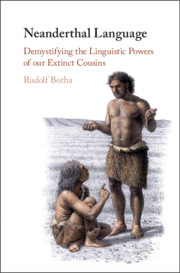Book contents
- Neanderthal Language
- Neanderthal Language
- Copyright page
- Contents
- Figures
- Images
- Acknowledgements
- Copyright Permission for Images
- Part I Preliminaries
- Part II Symbolic Behaviours
- 3 Making and Wearing Personal Ornaments
- 4 Producing Cave Art
- 5 Beautifying Bodies
- 6 Burying the Dead
- 7 Leaping to Language
- Part III Non-symbolic Behaviours
- Part IV Implications
- Notes
- References
- Index
6 - Burying the Dead
from Part II - Symbolic Behaviours
Published online by Cambridge University Press: 26 April 2020
- Neanderthal Language
- Neanderthal Language
- Copyright page
- Contents
- Figures
- Images
- Acknowledgements
- Copyright Permission for Images
- Part I Preliminaries
- Part II Symbolic Behaviours
- 3 Making and Wearing Personal Ornaments
- 4 Producing Cave Art
- 5 Beautifying Bodies
- 6 Burying the Dead
- 7 Leaping to Language
- Part III Non-symbolic Behaviours
- Part IV Implications
- Notes
- References
- Index
Summary
Chapter 6 elucidates and appraises the deliberate-burial inference about Neanderthal language. In outline, this inference comprises the following three inferential steps: Data about the Neandertal skeletal remains R1,…,Rn found in the state C at the caves C1,…,Cn along with the objects O1,…,On → These Neanderthals were deliberately buried → The Neanderthals who carried out the burials behaved symbolically → These Neanderthals had language. The first inferential step is found to be well warranted by an accepted theory of the properties of deliberate Neanderthal burials. One of these properties is that the skeletal remains are located in a natural or Neanderthal-made pit. For the second inferential step to be empirically grounded, the skeletal remains are required to be accompanied by grave goods, objects ritually deposited along with the body for use in after life. There isn't evidence that the objects – e.g., flint scrapers, the upper jawbone of a red dear, a rhinoceros tooth – found along with Neanderthal skeletal remains were indeed grave goods. The second inferential step is, accordingly, considered unsound in the literature, leaving the third ungrounded.
- Type
- Chapter
- Information
- Neanderthal LanguageDemystifying the Linguistic Powers of our Extinct Cousins, pp. 88 - 96Publisher: Cambridge University PressPrint publication year: 2020

